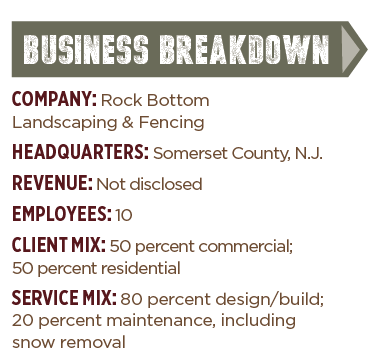
Finding a way to keep good employees on staff year-round has been a positive investment for one landscape firm.
The Problem: Chris Demato, owner of Rock Bottom Landscaping & Fencing in Somerset County, N.J., was sick of worrying about losing valuable employees to other lines of work during the offseason.
The Inspiration: Navigating the January to March lull can be tricky for landscape company owners. Brainstorming ways to approach the winter layoff differently, Demato decided to abolish the layoff period altogether.
The Solution: Employing quality people is the key to running a successful service business, Demato says. With a staff of 10 employees, losing one to another line of work can be devastating. To reduce the chances of that happening, four years ago Demato revamped his pay plan to keep employees on the payroll throughout the winter. A growing snow business also justified keeping a full-time staff.
In 15 years of business, Demato typically retained most of his workforce. Still, he always felt nervous he could lose someone over the winter.
Originally, Rock Bottom employees were on payroll during the regular season, March to December. From January to March, the company’s snow operation paid per snow event. The company would round up workers when it snowed or when a job came up. With this setup, employees didn’t have a steady income throughout the winter and had to hope Mother Nature came through with some work. This scenario left employees uncertain when another check would come in, and uncertainty can lead employees astray.
Demato decided restructuring his pay plan was the best way to keep valuable employees around. Under the new plan, employees are paid for 40-hour workweeks through the winter—instead of one-time payments whenever a snow event or a job came in. If one winter brings above average snowfall, employees get bonus pay for extra time worked. But now, they aren’t penalized for a below average winter. Often, they don’t even work 40 hours a week.
To devise the plan, Demato considered the average amount Rock Bottom paid out over the past few winters and budgeted for that amount. The new plan cost about 20 percent more than he was expecting. Still, Demato says it’s worth the investment.
 “That extra money is well worth the advantage of having employees available at our convenience during the winter,” Demato says. “We also get emergency calls through the winter for fallen trees or cleanups, and now we have workers ready to go at any time, whereas before we would have to coordinate a specific day and time.”
“That extra money is well worth the advantage of having employees available at our convenience during the winter,” Demato says. “We also get emergency calls through the winter for fallen trees or cleanups, and now we have workers ready to go at any time, whereas before we would have to coordinate a specific day and time.”
Most Rock Bottom employees are on the new pay plan. The company averages one new employee per year, and Demato vets new team members before giving them year-round pay status. Some employees have opted out due to other offseason work or a lack of affinity for snow work.
A side benefit is the positive effect on quality and customer service, as employees become more familiar with clients and their properties. And employee longevity has become a selling point for the company.
“It allows us to talk about the cumulative years of experience of the entire crew,” Demato says. “Customers love to see familiar faces and have formed relationships with our employees over the years.”
Though the new payment structure costs more, the peace of mind that’s come with it is worth the investment, Demato says.
“I fixed the problem of having to worry about losing our experienced and qualified help,” Demato says. “And my employees are also very happy about the stability of the year-round employment. It’s a win-win.”
Photo: Rock Bottom Landscaping & Fencing
